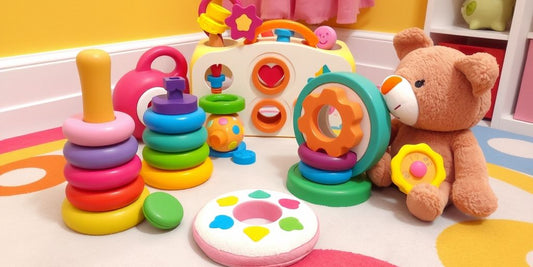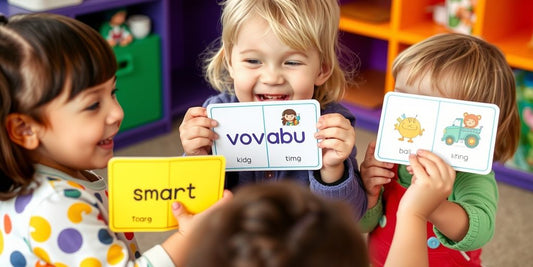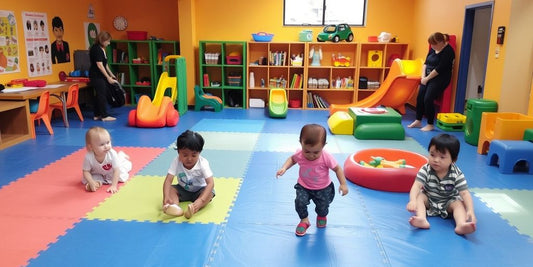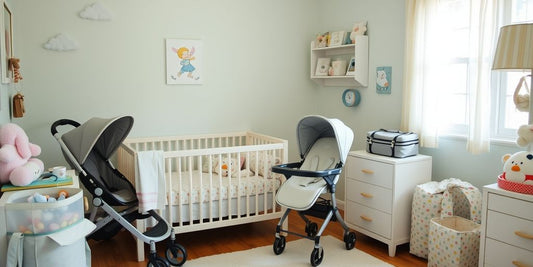Expecting a new baby is a thrilling time, but it can also be overwhelming with all the preparations needed. To help you get ready, we've created a comprehensive checklist to ensure your home is baby-ready. From setting up the nursery to babyproofing your house, this guide covers everything you need to know.
Key Takeaways
- Choose a nursery room that has good lighting and is close to the parents' room.
- Invest in essential baby gear like cribs, changing tables, and rocking chairs.
- Organize baby essentials such as clothing, diapers, and feeding supplies in advance.
- Set up convenient stations around the house for diaper changing, feeding, and sleeping.
- Babyproof your home by securing furniture, installing safety gates, and removing choking hazards.
Choosing the Perfect Nursery Room
Preparing a nursery is an exciting part of welcoming a new baby. Start by planning the layout of your nursery. Consider the room's size and shape, and think about how you will arrange the furniture. A well-thought-out layout can make a big difference in how functional and cozy the room feels.
Essential Baby Gear and Furniture
Preparing for a new baby involves gathering essential gear and furniture to ensure comfort and safety. Here's a breakdown of what you'll need:
Cribs and Sleeping Arrangements
A crib is a must-have for your baby's sleep. Opt for a firm mattress that fits perfectly to reduce the risk of SIDS. Some parents also choose a bassinet for the first few weeks due to its portability. Don't forget a night-light to help during those late-night feedings.
Changing Tables and Dressers
A changing table makes diaper changes easier and more organized. Look for one with ample storage for diapers, wipes, and creams. Dressers or other storage solutions are essential for keeping your baby's clothes and essentials organized.
Rocking Chairs and Gliders
A comfortable chair in the nursery is perfect for feeding, reading, or soothing your baby to sleep. Rocking chairs and gliders provide a gentle motion that can be very calming for both you and your baby.
Investing in multi-functional furniture, like a 3-in-1 crib that converts to a toddler bed and daybed, can save money and space in the long run.
Organizing Baby Essentials

Clothing and Diaper Storage
Keeping your baby's clothes and diapers organized is crucial. Use drawer dividers to separate different types of clothing like socks, bibs, and onesies. Hanging storage shelves in the closet can also maximize space and keep everything within reach. Consider having three labeled containers for keepsakes, outgoing clothes, and clothes you want to save. This way, you can easily manage the rapid changes in your baby's wardrobe.
Bathing Supplies and Towels
For bathing supplies, keep everything in one place. Use a caddy or a basket to store baby shampoo, soap, and towels. This makes bath time more convenient and ensures you have everything you need at hand. Make sure to regularly check for any items that need restocking.
Feeding Supplies and Bottles
Organize feeding supplies by designating a specific area in your kitchen. Use bins or baskets to store bottles, nipples, and breast pump parts. Sanitize bottles and nipples before the baby arrives to ensure they are ready for use. Having a dedicated space for feeding supplies will make meal times smoother and more efficient.
Keeping your baby's essentials organized not only makes daily routines easier but also ensures that you have everything you need at your fingertips.
Creating Convenient Stations
Setting up convenient stations around your home can make life with a newborn much easier. Having organized spaces for feeding, changing, and sleeping will save you time and energy during those first few weeks.
Diaper Changing Stations
You'll likely need at least two diaper changing stations: one in the living room or where you spend most of your time during the day, and another where your baby sleeps. Here are some essentials for your changing stations:
- Diapers and wipes
- Changing pad
- Diaper rash cream
- Storage bin or caddy
Feeding Stations
A nearby feeding station is vital. You can set this up in your bedroom, living room, or nursery. Include the following items:
- Comfortable chair
- End table with phone charger
- Healthy snacks and water
- Breast pump and bottles
Sleeping Stations
Your baby will need a safe and comfortable place to sleep. Consider setting up a sleeping station in your bedroom and another in the living room. Essentials include:
- Crib or bassinet
- Swaddle blankets
- White noise machine
Having these stations set up will make your daily routine smoother and more manageable. You'll have everything you need within arm's reach, making it easier to care for your baby.
Babyproofing Your Home
Securing Furniture and Appliances
To keep your baby safe, anchor all your furniture. This includes dressers, shelves, and any other heavy items that could tip over. Babies love to climb, and securing these items will prevent accidents. Also, make sure to secure appliances like TVs and microwaves.
Installing Safety Gates and Locks
Safety gates are essential if you have stairs. They prevent falls and can also be used to block off rooms. Additionally, install safety locks on cabinets, especially those containing cleaning supplies or medicines. This will keep your curious baby from getting into dangerous items.
Checking for Choking Hazards
Get down on all fours and look at your home from your baby's perspective. This will help you spot small items that could be choking hazards. Be sure to check under furniture and in corners. Remove or secure any small objects that your baby could put in their mouth.
Babyproofing is an ongoing process. As your baby grows and becomes more mobile, you'll need to reassess and update your safety measures.
By following these steps, you'll create a safer environment for your little one to explore and grow.
Preparing for Daily Life with a Newborn
Meal Prepping and Freezer Meals
One of the best ways to ease the transition into life with a newborn is by preparing meals in advance. Make food and freeze it. This will save you from having to forage the cupboards or, worse, brave the supermarket during those first few chaotic weeks. Plan to get a variety of meals ready at least a month before your due date.
Setting Up a Cleaning Routine
Newborns or infants don't really follow a schedule or routine until they are closer to a year old. It's usually pointless to attempt to adhere to a strict cleaning schedule. Instead, focus on maintaining a flexible routine that allows you to keep your home tidy without adding stress.
Managing Visitors and Support
Having a newborn can attract a lot of visitors, eager to meet the new family member. While support is wonderful, it's important to manage it in a way that doesn't overwhelm you. Set boundaries and let people know the best times to visit. Don't hesitate to ask for help when you need it, whether it's for holding the baby while you shower or bringing over a meal.
The first few weeks with a newborn can be overwhelming, but with some planning and support, you can make the transition smoother for everyone involved.
Preparing Siblings and Pets

Introducing the New Baby to Siblings
Bringing a new baby home is a big change for everyone, especially for older siblings. Involve older siblings in caring for the baby, whether it's helping with diaper changes or singing lullabies. This fosters a sense of responsibility and love. You can also read books about new siblings or let them pick out a special toy for the baby.
Preparing Pets for the New Arrival
Your furry family members will also need to adjust to the new baby. Actively prep your pup for his future "sibling." Though it may seem silly, get a doll and treat it as you will your infant. Carry it around at home, coo to it, and even put it in the crib. This helps pets get used to the new routines and sounds.
Creating a Calm Environment for Everyone
A calm environment is essential for a smooth transition. Set up quiet zones where siblings and pets can retreat if they feel overwhelmed. Keep a consistent routine to help everyone adjust more easily. Remember, patience and understanding go a long way in making this new chapter enjoyable for the whole family.
Conclusion
Getting your home ready for a new baby can seem like a big task, but with a little planning, it can be a fun and exciting time. By following a checklist and preparing each room step-by-step, you'll ensure that everything is in place for your baby's arrival. Remember to set up essential stations, babyproof your home, and make space for baby items in different rooms. Don't forget to prepare meals in advance and stock up on household necessities to make those first few weeks easier. With everything organized and ready, you can relax and look forward to welcoming your new bundle of joy into a safe and loving home.
Frequently Asked Questions
When should I start preparing my home for a new baby?
It's a good idea to start preparing your home during the second trimester. This gives you plenty of time to get everything ready without feeling rushed.
What are the most important items to have in the nursery?
The most important items include a crib, a changing table, and a comfortable chair for feeding. You'll also need storage for clothes and diapers.
How can I make my home safe for a newborn?
Babyproofing is essential. Secure furniture to the walls, cover electrical outlets, and install safety gates where needed. Crawling around on your hands and knees can help you see potential hazards from a baby's perspective.
What should I stock up on before the baby arrives?
Make sure you have plenty of diapers, wipes, baby clothes, and feeding supplies. It's also helpful to prepare and freeze meals in advance.
How do I prepare my pets for the new baby?
Gradually introduce your pets to the new baby items and sounds. Consider using baby lotions or powders on yourself before the baby arrives so pets can get used to the new scents.
How can I involve older siblings in preparing for the new baby?
Involve older siblings by letting them help set up the nursery or pick out baby clothes. Reading books about new siblings can also help them understand and get excited about the new arrival.









